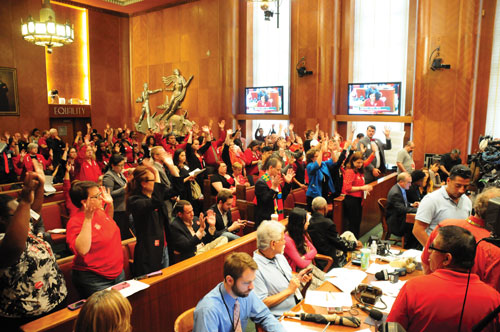
Understanding the Houston Equal Rights Ordinance
Now that we have one, what does it mean?
by Megan Smith
Photo by Christopher Bown
Houston, we have a HERO.
Cheers of “HERO! HERO! HERO!” filled Houston City Hall on the evening of May 28, as those clad in red embraced and rejoiced. After a much-anticipated and long-awaited roll call vote, the Houston Equal Rights Ordinance (HERO) passed 11-6, with Council Members Brenda Stardig (District A), Oliver Pennington (District G), Michael Kubosh (At-Large 3), Dwight Boykins (District D), Jack Christie (At-Large 5), and Dave Martin (District E) voting “No.”
The ordinance, which was first introduced by Mayor Annise Parker on April 21, prohibits discrimination on the basis of any protected characteristic (sex, race, color, ethnicity, national origin, age, familial status, marital status, military status, religion, disability, sexual orientation, genetic information, gender identity, or pregnancy) in city employment, city contracting, housing, places of public accommodation, and most private-sector employment. Violators could be fined up to $5,000.
“This is not the most important thing I have done or I will do as mayor,” Parker said following the vote. “But it is the most personally satisfying and most personally meaningful thing that I will do as mayor.”
City Council heard over 20 hours of public testimony from those on both sides of the debate in the weeks leading up to the HERO vote. While supporters argued this ordinance is necessary in order for all Houstonians to be treated with fairness and respect, opponents—who consisted mostly of clergy members and others who oppose the HERO based on religious grounds—attempted to frame the ordinance as a “sexual predator protection act.”
Two major amendments to the ordinance were adopted before the Council’s final vote. The first, which was proposed by Council Member Robert Gallegos (District I), lowered the ordinance’s threshold relating to private-sector employment. As originally drafted, the HERO would have only applied to private employers with 50 or more workers. With the Gallegos amendment, however, the ordinance now prescribes that after one year, firms with 25 or more employees will be covered; two years after passage, the ordinance will apply to firms with 15 or more employees.
The second significant amendment, from Council Member Jerry Davis (District B), removed the ordinance’s controversial “bathroom language” that specifically addressed transgender Houstonians’ rights to use the bathroom that most closely aligns with their gender identity. While those opposing the ordinance claimed that this language in Section 17-51(b) would allow “men in dresses” to enter women’s restrooms and pose a threat to women and children, the LGBT community said the phrasing of the clause allowed businesses an out if the defendant had a “good-faith belief” that the person’s claim of being transgender was false.
Although this language was removed, Mayor Parker assured transgender Houstonians that they continue to be protected under the ordinance and that they are still able to file a discrimination complaint with the Office of the Inspector General if barred from using a restroom based on their gender identity or any other protected characteristic. “To my trans sisters/brothers: you’re still fully protected in the Equal Rights Ordinance. We’re simply removing language that singled you out,” Parker said on Twitter.
While supporters of the ordinance are rejoicing in its passage, opponents have vowed to continue fighting the HERO by petitioning for a referendum on the November ballot. The opposition needs to gather roughly 17,000 signatures by the end of June in order to put the issue before Houston voters.
While conflicting messages about the HERO continue to fly, sorting through what the ordinance will and will not do can be difficult. OutSmart spoke with Council Member Ellen Cohen (District C) and Council Member Robert Gallegos (District I) to seek clarification on what the HERO will mean for Houstonians.
The following statements about the HERO are TRUE.
- Before the HERO was passed, Houston was the only major metropolitan area in the country that did not prohibit discrimination in places of public accommodation. [Our city had] no protection against discrimination in employment on the basis of sexual orientation or gender identity. Houston believes that all persons living in or visiting the city are entitled to be treated with equal dignity, respect and status, and have the right to be free from discriminatory and unequal treatment. —Council Member Robert Gallegos
- The ordinance is good for business. Yes, the ordinance is good for business. Frankly, if we didn’t pass it, I think it would have put us at a disadvantage. It would have threatened organizations, conventions, and businesses in terms of moving here. As you’ve seen happen in places like Arizona, [a number of organizations] said they just weren’t going to come to Arizona because of the business position [that lawmakers were] taking. We heard from the Greater Houston Partnership and the Houston Sports Authority, and they believed that not passing the ordinance would be detrimental to the business of Houston. Passing the ordinance tells the rest of the world to come to Houston—we’re open and we’re receptive. —Council Member Ellen Cohen
- The ordinance does not apply to religious organizations. The ordinance provides exemptions for religious organizations in the provisions that deal with places of public accommodation, private employment, and fair housing. — Council Member Gallegos
- This ordinance is designed to conciliate, not to punish. It’s designed to bring people who have been discriminated against together with people who may have done the discriminating, to see if we can’t have some kind of understanding. It’s not designed to be punitive. It’s really designed to conciliate. — Council Member Cohen
- Complaints filed with the Office of the Inspector General—part of the Legal Department—will be subject to existing confidentiality protections, to the extent permitted by law. — Council Member Gallegos
- Anyone living or working in Houston is entitled to be treated with equal dignity and respect. And that’s what this ordinance will do. — Council Member Cohen
- The ordinance provides the average person on the street a quick and expeditious way to file a complaint on an establishment that may have violated these rights. HERO mirrors federal laws and policies many private employers already have in place which ban discrimination on the basis of sex, race, ethnicity, national origin, age, familial status, military status, religion, disability, genetic information, sexual orientation, and gender identity. —Council Member Gallegos
The following statements about the HERO are FALSE.
- The ordinance will allow men to put on dresses and enter women’s restrooms to prey on women and children. Clearly, that’s a falsehood. It doesn’t allow men to throw on a dress and run into a women’s bathroom. It allows people who identify with the sex that they feel most closely related to to use the bathroom that most closely relates to that gender. But more importantly, Houston is the only major city that didn’t have an ordinance like this. The ones that already have similar ordinances have not seen a stream of men in dresses running in to [women’s] bathrooms—in fact, we don’t think there have been any cases. —Council Member Cohen
- Businesses will be required to build a third, unisex restroom facility. False. Transgender persons already use restrooms consistent with their gender identity. —Council Member Gallegos
- We don’t have discrimination in Houston. We know we have discrimination in Houston because of all the true, actual stories that people have told [to City Council] about experiencing discrimination. So although we are the most ethnically diverse city, we still have it. — Council Member Cohen
- HERO will put women and children at risk of sexual assault. False. Similar non-discrimination ordinances and private-sector policies have not led to increased assaults. —Council Member Gallegos
- This ordinance is just for the LGBT community. That’s clearly not true. This is not an LGBT ordinance. It’s an ordinance for the City of Houston, which includes the LGBT community among the other communities that are being discriminated against. —Council Member Cohen











One Comment